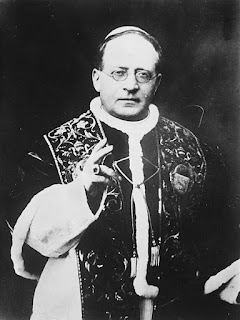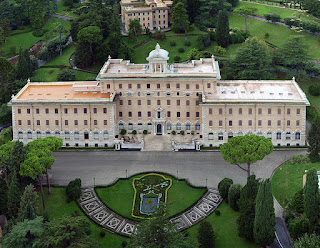Former engineer laid foundations for financial strength of the Papacy
 |
| Bernardino Nogara is said to have made vast sums for the Vatican |
Nogara had returned to his homeland - he was born in Bellano, around 80km (50 miles) north of Milan on the shore of Lake Como - upon retiring from his position as Director of the Special Administration of the Holy See in 1954, at the age of 84.
Although details of the Vatican’s finances have traditionally been shrouded in secrecy, Nogara is thought to have swelled the papal coffers by hundreds of millions of dollars during his 25 years in charge.
Yet he is regarded by many commentators as a controversial figure because of the nature of some of his investments. He was alleged to have put money into companies whose businesses could be seen to be incompatible with Catholic Church doctrines, made loans to Mussolini’s Fascists, and clandestinely invested in companies that both enabled and profited from the deadly aggression of the Axis powers in World War Two.
Nogara’s background was in engineering. A graduate in industrial and electrical engineering at the Polytechnic University of Milan, he managed mining projects in Bulgaria and Wales as well as Italy before undertaking work in Istanbul shortly before the dissolution of the Ottoman Empire.
Well connected politically, it was while he was in Istanbul that he became involved with the Banca Commerciale Italiana (BCI) and was appointed Italian representative to an international committee overseeing the failed empire’s debts. He would later become a director of the BCI.
 |
| Pope Pius XI, who put Nogara in charge of the papal finances |
The money - 750 million lire plus a further one billion lire in Italian government bonds - rescued the Vatican from the brink of bankruptcy, although it was to suffer further blows later in the year as a result of the Wall Street Crash.
Nogara was called by Pius XI to direct the Special Administration of the Holy See, charged with managing the compensation sum awarded and, by virtue of shrewd investment, using it as the foundation for the Vatican’s future prosperity.
The belief that Nogara accepted the role with conditions - namely that he would not be “restricted by religious or doctrinal considerations” in such investments as he made - is disputed by some historians.
Yet his reported investment in the Istituto Farmacologico Serono di Roma, Italy's largest manufacturer of birth control products, would seem unlikely to have been approved if subject to vetting.
Neither, it has to be assumed, would his alleged investment in munitions plants and other war industries, including direct loans to Mussolini's government prior to his invasion of Ethiopia in 1935.
Nogara, who was kept on in his role after the death of Pius XI ushered in Pius XII in 1939, was able to keep much of his business dealings on the Vatican’s behalf away from close scrutiny by creating a vast network of companies, running into hundreds across multiple countries, which gave him greater scope for making investments of a controversial nature that would not easily be traced back to the Vatican.
These are alleged by some commentators to have included some concerns that were blacklisted by the Allies for helping to finance the Axis war machine.
Shortly before he died, Nogara was granted the decoration of Knight Grand Cross of the Piano Order, the highest pontifical honor for a layman, by Pope John XXIII.
Bellano, where Bernardino Nogara was born, is a picturesque village on the eastern shore of Lake Como, just under 30km (19 miles) north of Lecco, noted for its narrow streets and colourful houses. Although its economy today is based largely on tourism, in Nogara's day it had a thriving textile industry. Once a Roman burial place, it was also a stopping-off point on the Sentiero del Viandante, an ancient mule track dating back to the Roman period that runs along the eastern coast of Lake Como. One of Bellano’s attractions is the Orrido di Bellano, a natural gorge created by the cold waters of the Pioverna river, which carved gigantic potholes and caves into the rock, the erosion having started 15 million years ago. A member of the association titled I Borghi più belli d'Italia - The most beautiful villages of Italy - Bellano is the location of most of the novels by local writer Andrea Vitali and the birthplace of the 17th-century writer and poet Sigismondo Boldoni. It also plays host to an opera every August.
Stay in Bellano with Booking.com
 |
| The Palace of the Governorate, designed by Giuseppe Momo, is part of the Vatican estate |
The Vatican City, which occupies an area of 44 hectares (110 acres) within the city of Rome and has approximately 1,000 citizens, is the smallest sovereign state in the world by both area and population. It came into existence in 1929 when an agreement was signed between the Kingdom of Italy and the Holy See to recognise the Vatican as an independent state. The treaty - known as the Lateran Treaty - settled what had been a long-running dispute regarding the power of the Popes as rulers of civil territory within a united Italy. The treaty was named after the Lateran Palace where the agreement was signed and although the signatory for the Italian government was the Fascist dictator Benito Mussolini, succeeding democratic governments have all upheld the treaty.
Also on this day:
1848: The murder of politician Pellegrino Rossi
1902: The birth of musician and conductor Annunzio Mantovani
1922: The birth of film director Francesco Rosi
1939: The birth of actor Enzo Staiola, child star of neorealist classic Bicycle Thieves
1940: The birth of fashion designer Roberto Cavalli
.jpg)
No comments:
Post a Comment